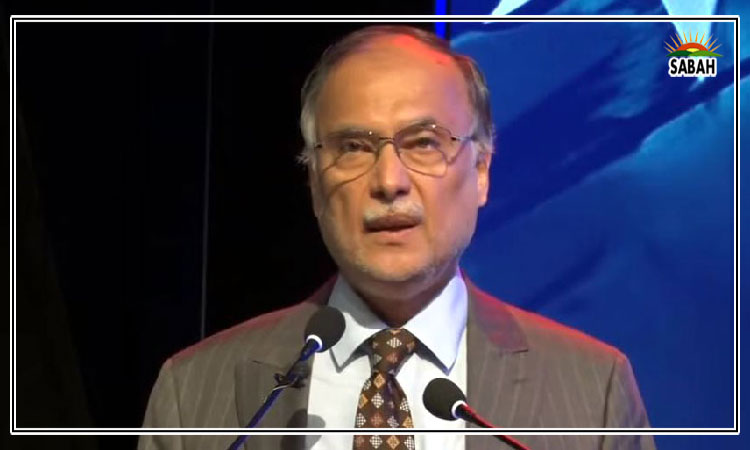Local scientists, researchers’ capacity development crucial for promoting indigenous sustainable urbanisation: Romina Khurshid Alam
ISLAMABAD, July 09 (SABAH): The Coordinator for the Prime Minister on Climate Change, Romina Khurshid Alam on Tuesday said the promotion of local scientists and researchers through capacity building and viable opportunities is crucial to drive indigenous sustainable urbanisation to ward off the risks of urban flooding.
 She was addressing as chief guest at the one-day workshop on Urban Floods: Implications for Resilience organised by the Pak-German Climate & Energy Partnership and Sustainable Development Policy Institute (SDPI).
She was addressing as chief guest at the one-day workshop on Urban Floods: Implications for Resilience organised by the Pak-German Climate & Energy Partnership and Sustainable Development Policy Institute (SDPI).

Romina Khurshid Alam said infrastructure development must keep climate risks in view to sustain climate aftershocks. She urged the forum to share all recommendations with the Ministry of Climate Change and Environmental Coordination.
The PM’s aide appreciated the workshop’s organisers in bringing together policy makers, practitioner and academia to co-create solutions that are driven by evidence. She noted that the capacity of local researchers should be developed and that they should have a stronger role in developing quality policy work. Research based policies are crucial to overcome impending risks and fill gaps in decision making.
She added that the legislators and policy makers needed such policies for informed decision-making. The PM’s Coordinator said adaptation goals needed to be set as per the local needs and realities as there were new technologies emerging in the field but indigenous knowledge techniques need to be incorporated in the climate risk mitigation strategies.
“The session convened local scientists and experts that made me feel proud as local scientists and experts should be engaged and equipped to work on addressing climate problems of the country,” she added.
The efforts and resources, she said needs to be utilised in right direction to achieve optimum results whereas youth and media needs to be trained further for enhancing climate resilience of the country.
“We need to promote Pakistani experts and human resource at all forums as the nation is resilient and knows better to fight crisis whereas this passion needs to be further scaled up,” she added.
In her opening remarks, Advisor, Pak-German Climate and Energy Partnership, Sobiah Becker said Pakistan is the first country with whom Germany forged partnership for climate action.
“We believe that the National Adaptation Plan needs a bottom-up and a top-down approach, whereas there is a need to focus on adaptation and resilirnce, as well as energy transition to mitigate negative climate impacts,” she added.
Associate Research Fellow SDPI, Zainab Naeem while setting up the background context said country’s urbanisation trend was primarily fueled by migration, instability and economic necessity.
The 2022 floods revealed extreme vulnerability of the urban centres against climate catastrophes that unveiled Pakistan’s need to improve its urban development trajectory with sustainable interventions to enhance resilience against disasters, she added.
She said the country had housing backlog of nine million units whereas climate risk insurance was absent in housing sector with limited awareness among the masses on it.
Dr. Zeba Sathar, Population Council Pakistan said population was crucial to ensure climate resilience interventions but it was extremely neglected internationally. She added that there was no mention of population at international COP forums and global community was also reluctant to discuss population under climate negotiations to offset carbon emissions generated through population boom.
She mentioned the case study of the Council indicating 14 districts with high risk levels and another 26 districts with medium risk of urban flooding in the country.
She said some 34 million urban population within the above districts was highly vulnerable to floods with over four million children and 1.2 million elderly people living in these areas who were the weakest among the population to relocate during disasters.
She recommended that there should be focus on adaptation strategies, additional data collection, better coordination among government agencies, and improved assessed of flood risk.
Dr. Irfan Rana, University of Nevada in his case study presentation said there is need to work on risk communication to educate masses on hazards of urban flooding.
Dr. Mattia Marconcini in his presentation said there is need to develop a robust platform based on heat maps where risk maps can be placed to identify high risk areas to identify potential vulnerable communities and enable informed decision making.
The workshop included group activity engaging academia, experts and media in addressing challenges pertaining to policy, legislation, capacity gaps to address urban flooding risks that helped in generating thoughtful discussions and recommendations to address these challenges.
A panel discussion was also held on it on urban response where the experts termed use of technology crucial to achieve resilience against floods and climate catastrophes.
Wolfgang Hesse, Cluster Coordinator, Energy & Climate GIZ Pakistan in his remarks said the workshop was critical to understand urban floods and resilience landscape in Pakistan. “Pakistan is eighth most vulnerable country due to climate change, whereas Floods of 2022 grim are reminder of its vulnerability to climate disasters,” he said.
The 2022 floods affected half of the population of the country and caused $15 billion infrastructure losses to the country, he added.
“40% Pakistanis are facing rapid urbanisation whereas the UN predicted that by 2025, 50% population of the country will be settling in urban areas, hence multiplying it’s vulnerability,” he added.
The GIZ, he said was working to enhance climate resilience in Pakistan and strengthening institutional capacities at different tiers under Pak-German Climate and Energy Partnership.
In his closing remarks, Dr. Shafqat Munir, Deputy Executive Director, SDPI said urbanisation is the focus due to massive displacement from rural to urban centres in the country whereas tempering with nature was increasing with unbridled urban expansion. “Major cities are at risk of urban flooding as natural flows are hampered due to urbanisation,” he said. He said Germany as friend of Pakistan was assisting in adopting modern technologies to cope with adverse climate events.
However, the National Disaster Management Authority is working around anticipatory actions that indicates that realisation has increased in the quarters concerned to actively cope with climate change impacts, he added.












